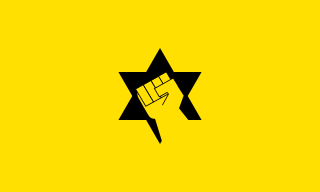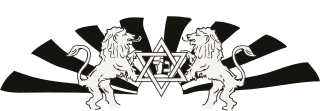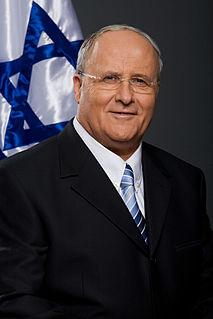 W
WReligious Zionism is an ideology that combines Zionism and Orthodox Judaism. Adherents are also referred to as Dati Leumi and most commonly known in Israel by the first part of that term in plural Datiim. The community is sometimes called כִּפָּה סְרוּגָה Kippah seruga, literally, "knitted skullcap", the typical head-covering worn by the men.
 W
WAhi is a right-wing religious Zionist political party in Israel. Founded in 2005, it was part of the National Union alliance between 2006 and 2008. For the 2009 elections, it ran a joint list with Likud.
 W
WBar-Ilan University is a public research university in the city of Ramat Gan in the Tel Aviv District, Israel. Established in 1955, Bar Ilan is Israel's second-largest academic institution. It has 18,000 students and 1,350 faculty members.
 W
WDance of Flags, or Flags Parade, is an annual parade on Jerusalem Day in Jerusalem and on a smaller scale every Rosh Chodesh, from the afternoon until the evening, to celebrate the reunification of Jerusalem and the renewal of Jewish and Israeli sovereignty in the holy places for the Jews, following the victory in the Six Day War.
 W
WEfraim "Effi" (Fine) Eitam is an Israeli brigadier general, former commander of the 91st Division, and a politician. A former leader of the National Religious Party, he later led a breakaway faction, Ahi, which merged into Likud in 2009. He served as a member of the Knesset between 2003 and 2009.
 W
WZevulun Hammer was an Israeli politician, minister and Deputy Prime Minister.
 W
WHapoel HaMizrachi was a political party and settlement movement in Israel. It is one of the predecessors of the National Religious Party and the Jewish Home.
 W
WThe Jewish Home is an Orthodox Jewish and religious Zionist political party in Israel. It was originally formed by a merger of the National Religious Party, Moledet, and Tkuma in November 2008. However, Moledet broke away from the party after its top representative was placed only 17th on the new party's list for the 2009 Knesset elections, and instead ran on a joint list with Hatikva. Tkuma later also left to join the National Union.
 W
WKach was a radical Orthodox Jewish, ultranationalist political party in Israel, existing from 1971 to 1994. Founded by Rabbi Meir Kahane in 1971, based on his Jewish-Orthodox-nationalist ideology, the party earned a single seat in the Knesset in the 1984 election, after several electoral failures. However, it was barred from participating in the next election in 1988 under the revised Knesset Elections Law banning parties that incited racism. After Kahane's assassination in 1990, the party split, with Kahane Chai breaking away from the main Kach faction. The party was also barred from standing in the 1992 election, and both organisations were banned outright in 1994.
 W
WReligious Zionism is an ideology that combines Zionism and Orthodox Judaism. Adherents are also referred to as Dati Leumi and most commonly known in Israel by the first part of that term in plural Datiim. The community is sometimes called כִּפָּה סְרוּגָה Kippah seruga, literally, "knitted skullcap", the typical head-covering worn by the men.
 W
WEin HaNetziv is a kibbutz in the Beit She'an Valley in northern Israel. Belonging to the Religious Kibbutz Movement, it is located about three kilometers south of the ancient city of Beit She'an, 130 meters below sea level. It falls under the jurisdiction of Valley of Springs Regional Council. In 2019 it had a population of 604.
 W
WStella K. Abraham Beit Midrash for Women, commonly known as Migdal Oz, is an Orthodox Jewish institution of higher Torah study for women located in the Kibbutz Migdal Oz in Gush Etzion in Israel.
 W
WThe Mizrachi is a religious Zionist organization founded in 1902 in Vilnius at a world conference of religious Zionists called by Rabbi Yitzchak Yaacov Reines. Bnei Akiva, which was founded in 1929, is the youth movement associated with Mizrachi. Both Mizrachi and the Bnei Akiva youth movement continued to function as international movements.
 W
WNoahidism or Noachidism is a monotheistic Jewish religious movement based upon the Seven Laws of Noah and their traditional interpretations within Orthodox Judaism. According to the Jewish law, non-Jews (Gentiles) are not obligated to convert to Judaism, but they are required to observe the Seven Laws of Noah to be assured of a place in the World to Come, the final reward of the righteous. The divinely ordained penalty for violating any of the Noahide laws is discussed in the Talmud, but in practical terms it is subject to the working legal system which is established by the society at large. Those who subscribe to the observance of the Noahic Covenant are referred to as Bnei Noach or Noahides. The modern Noahide movement was founded in the 1990s by Orthodox rabbis from Israel, mainly tied to Chabad-Lubavitch and religious Zionist organizations, including The Temple Institute.
 W
WZevulun Orlev is an Israeli politician and a former Knesset member, Minister of Welfare & Social Services and leader of the National Religious Party. Orlev is a decorated war hero who received the Medal of Distinguished Service in the Yom Kippur War.
 W
WOtzma Yehudit is a far-right political party in Israel, which has been referred to as Kahanist and anti-Arab. It was originally formed as Otzma LeYisrael, and was established on 13 November 2012 by MKs Aryeh Eldad and Michael Ben-Ari, who split from the National Union to form a new party ahead of the 2013 elections. Despite coming to an agreement with the Jewish Home to contest the 2020 Israeli legislative election as the United Jewish Home, Otzma was left to run independently when the Jewish Home, the New Right, and Tkuma re-formed Yamina. In the 2021 election, Otzma ran on a joint list with the Religious Zionist Party and Noam, sparking outrage among many.
 W
WYitzchak Yaacov Reines, was a Lithuanian Orthodox rabbi and the founder of the Mizrachi Religious Zionist Movement, one of the earliest movements of Religious Zionism, as well as a correspondent of Theodor Herzl.
 W
WRinat Yisrael is a family of siddurim, popular within the Religious Zionist communities in Israel; and used by some Modern Orthodox in the Diaspora. They are available in Hebrew only. The siddur was first published in 1970 by the Moreshet Publishing Company, and edited by Dr. Shlomo Tal.
 W
WThe State of Judea is a proposed halachic state in the West Bank put forward by Israeli Jewish settlers. After the Palestine Liberation Organization (PLO) declared the existence of a Palestinian state in 1988, some settler activists feared that international pressure would lead Israel to withdraw from the West Bank and sought to lay the groundwork for an Orthodox Jewish state in the West Bank if this came to pass. The establishment of this state was announced in a Jerusalem hotel on December 27, 1988. Veteran Kahanist, Michael Ben-Horin, was declared president of the state of Judea. In January 1989 several hundred activists met and announced their intention to create such a state if Israel withdrew.
 W
WThe Hebrew expression Torat Eretz Yisrael refers to the idea that Torah thoughts emanating from the land of Israel are of great religious status. In the Midrash Genesis Rabbah it is stated: “there is no Torah like the Torah of the Land of Israel, and there is no wisdom like the wisdom of the Land of Israel." Another midrash in the Sifre indicates that there is a unique flavor to the land of Israel because the Torah is located in it.
 W
WThe Ultra Zionists is a British documentary that was televised on 3 February 2011. Louis Theroux investigates ultra-nationalist Jewish settlers in East Jerusalem, Hebron and Nablus. The documentary also follows Theroux as he tours the Muslim quarter of Jerusalem with Daniel Luria of the Ateret Cohanim Zionist Movement.
 W
WHillel Weiss is a professor emeritus of literature at Bar Ilan University in Israel.
 W
WYamina or Yemina is an Israeli political alliance of right-wing parties that was originally configured as the New Right and the Union of Right-Wing Parties. The current incarnation of the alliance includes only the New Right, as The Jewish Home left the alliance on 14 July 2020, and the Religious Zionist Party left on 20 January 2021.
 W
WAbraham Leib Zissu was a Romanian writer, political essayist, industrialist, and spokesman of the Jewish Romanian community. Of lowly social origin and a recipient of Hasidic education, he became a noted cultural activist, polemicist, and newspaper founder, remembered primarily for his Mântuirea daily. By the end of World War I, he emerged as a theorist of Religious Zionism, preferring communitarianism and self-segregation to the assimilationist option, while also promoting literary modernism in his activity as novelist, dramatist, and cultural sponsor. He was the inspiration behind the Jewish Party, which competed with the mainstream Union of Romanian Jews for the Jewish vote. Zissu and Union leader Wilhelm Filderman had a lifelong disputation over religious and practical politics.
 W
WThe Zomet Institute is an Israeli high-tech non-profit organization specializing in IT equipment and electronic appliances designed to meet Halakha.